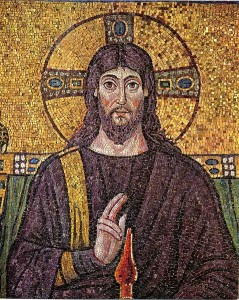====================
This sermon was preached on Sunday, July 1, 2012, at St. Paul’s Episcopal Church, Medina, Ohio, where Fr. Funston is rector. (Revised Common Lectionary, Proper 8B: Wisdom of Solomon 1:13-15;2:23-24; Lamentations 3:21-33; 2 Corinthians 8:7-15; and Mark 5:21-43.)
====================
 Our first reading this morning is from a little book from the Apocrypha called The Book of Wisdom. At one time church tradition ascribed authorship to King Solomon, but it is now believed to have been written sometime in the first or second century before Christ by a Greek-speaking Jew of the Diaspora. It is found in the Greek-language version of Jewish scriptures, not in the Hebrew version, and is therefore not considered as canonical scripture by Jews or by Protestants. Roman Catholics and the Eastern Orthodox do accept it, and we Anglicans take a middle course, saying that we read them “for example of life and instruction of manners; but yet [we do] not apply them to establish any doctrine.” (Articles of Religion, Art. VI, BCP 1979, pg. 868). Well, here’s an example of life, then:
Our first reading this morning is from a little book from the Apocrypha called The Book of Wisdom. At one time church tradition ascribed authorship to King Solomon, but it is now believed to have been written sometime in the first or second century before Christ by a Greek-speaking Jew of the Diaspora. It is found in the Greek-language version of Jewish scriptures, not in the Hebrew version, and is therefore not considered as canonical scripture by Jews or by Protestants. Roman Catholics and the Eastern Orthodox do accept it, and we Anglicans take a middle course, saying that we read them “for example of life and instruction of manners; but yet [we do] not apply them to establish any doctrine.” (Articles of Religion, Art. VI, BCP 1979, pg. 868). Well, here’s an example of life, then:
God did not make death,
And he does not delight in the death of the living.
For he created all things so that they might exist;
the generative forces of the world are wholesome….
God, says this odd little book, created human beings for immortality.
So here’s some “instruction of manners”: when something bad happens to someone, particularly if someone’s loved one dies, if someone has a miscarriage, if someone is diagnosed with a serious illness (like, say, terminal cancer), do not say, “Well, it’s God’s will. We may not understand it, but it’s part of God’s plan.” And if anyone says that to you or to a loved one or to a friend or even to a stranger, tell them they’re wrong. In fact, if it will make you feel better, you tell them to stick it in their ear! Death is not God’s will; it never was and it never will be! “God,” as the Book of Wisdom says clearly, “did not make death.”
But, of course, someone will say to me, “Wait! You’re making a doctrinal statement based on an apocryphal text and we Anglicans are not supposed to do that.”
OK, yes, that’s what I’m doing, but my “doctrinal statement” is not based only on this small portion of Wisdom. We also have Lamentations in the Lectionary texts this morning: “The Lord will not reject forever. Although he causes grief, he will have compassion according to the abundance of his steadfast love; for he does not willingly afflict or grieve anyone.” God is not in the business of causing grief and suffering; the Prophet Ezekiel, as well, assures us God takes no “pleasure in [even] the death of the wicked, [but would] rather that they should turn from their ways and live?” (Ezek. 18:23) In other words, God is not in the business of causing death! God is in the business of healing and life.
In addition, elsewhere in Scripture, we have the promise of God through the Prophet Isaiah that “he will swallow up death forever,” (Isaiah 25:8) , that the “dead shall live, their corpses shall rise . . . . and the earth will give birth to those long dead,” (26:19), that God is “about to create new heavens and a new earth.” (65:17) In that new reality, “no more shall there be in it an infant that lives but a few days, or an old person who does not live out a lifetime; for one who dies at a hundred years will be considered a youth, and one who falls short of a hundred will be considered accursed . . . . The wolf and the lamb shall feed together, the lion shall eat straw like the ox . . . . They shall not hurt or destroy on all [God’s] holy mountain [meaning everywhere].” (65:20,25) In other words, God is not in the business of causing death! God is in the business of healing and life.
This is what our Gospel reading today assures us in these two stories of Christ healing two women: the daughter of the synagogue ruler Jairus and the unnamed women who touched him in the market place. Jairus had faith that God’s will for his daughter was healing and so he came to Jesus; the woman with the hemorrhage had faith that God’s will for her was healing and so she thought, “If I could just touch the hem of his garment . . . .” God’s will for us is healing; we just have to have faith in that promise.
Faith, however, does not mean believing the unbelievable; it means holding on to God’s promise, despite whatever present realities call it into question. To the writer of Lamentations, which was written in the 6th Century before Christ at time when the Temple (indeed the whole of Jerusalem) had been destroyed and it seemed all hope was lost, such faith meant holding to the credal and communal memory of what God had done for God’s people in ages past. It meant calling God’s mighty works of healing and strength into the present through prayer and proclamation.
For Jairus and the women in the market place, it meant holding fast to God’s promise that he would bring “recovery and healing” to God’s people, that he would “heal them and reveal to them abundance of prosperity and security” (Jer. 33:6), and believing that that promise was made manifest in Jesus of Nazarth. It means the same for us today. It means laying claim to Jesus’ works of healing and strength, and bringing them into the present through prayer and proclamation in the context and community of fellow Christians who support and restore our faith, who recite it with us in the creed, who proclaim it to us in the sermon, who sing it with us in the liturgy and hymns. Even in times when it appears that all is lost, the community of faith helps us to hear the voice of faith saying, “The Lord is good to those who wait for him [God] does not willingly afflict or grieve anyone.” God is not in the business of causing death! “God created all things so that they might exist; the generative forces of the world are wholesome.” God is in the business of healing and life.
This, of course, just raises a question: what if we have faith and pray for someone who is ill, but the sick person does not get better? What if we pray and pray and despite all of our prayer, the person die? Does that mean that we did not have faith or did not have enough faith?
Well, as another preacher has remarked
. . . that depends. Is God obligated to His creatures to answer all prayers with Yes? Is God no more than a cosmic Coke machine, who must dispense what we want when we put in the proper amount? Or does our God have His own will, His own plan, and His own wisdom, which may transcend ours? Personally, I am more comfortable with the idea that God would override any requests I make, if He deems them not in my best interest. What if I ask for something that will cause me great damage, mistakenly believing, in faith, that I need it? Would it not attribute great cruelty and maliciousness to God if we supposed that He were obligated by some scriptural contract to give me what I ask for, no matter what? (Ken Collins, Faith Healing)
If there is healing in response to prayer, we know that it was God’s will to heal, but if there was no healing in response to prayer, the answer isn’t so simple. Perhaps healing at a later date would do more good. Perhaps the illness, if prolonged, might lead to fruitful introspection and a new spiritual awareness. Perhaps the person’s earthly life, if prolonged, might be a source of pain and misery for that person or another. Sometimes the answer to prayer is “No” and we cannot know why. “We have to give God credit for being smarter and wiser than we are, and we must acknowledge that we cannot always immediately apprehend [God’s] designs.” (Ken Collins, Faith Healing) But we can know this: God is not in the business of causing death! God is in the business of healing and life.
As the Book of Wisdom poetically reminds us, “God did not make death . . . but through the devil’s envy death entered the world.” One of the great illusions of our time, some would say that is one of Satan’s great lies, is that through our own effort, through our own science, through our own better medicine, we can live forever. It makes us feel that death is wrong. It comes as a surprise, even when we say that we expect it. We are always surprised by death! But in our Gospel story this morning, we learn that Jesus views death differently; Jesus treats death as if it were simply like falling asleep. Last night (assuming your neighbor was not shooting off fireworks prematurely) you went to sleep. This morning you woke up to a new day. “Death,” says Jesus, is like that.” You fall asleep . . . you wake up. In this Gospel story the young girl wakes up. Jesus shows us that death, the devil’s creation, Satan’s great illusion, is not fatal. Death is merely another form of sleep, because God did not make death; God is not in the business of causing death! God created all things so that they might live. God created human beings for immortality. God is in the business of healing and life.
Let us pray:
O merciful Father, you have taught us in the Holy Scriptures that you do not willingly afflict or grieve anyone: Look with compassion upon all who are in pain or sorrow, all who are troubled by illness, all who tend any who are dying; remember them, O Lord, in mercy, nourish their souls with patience, and comfort them with a sense of your goodness; empower us, O Lord, to minister to their needs and to offer support for their faith; that all may be strengthened in times of weakness and have confidence in your loving care; through Jesus Christ our Lord. Amen.
 The readings for the Daily Office on a Sunday depart from the daily flow of the lessons for the rest of the week; they are also unrelated to the lessons in the Eucharistic lectionary (especially since our adoption of the Revised Common Lectionary). On Sundays in recent weeks, those who recite the Daily Office have been treated to excerpts, like this, from the Book of Acts. I’ve set out the whole of today’s lesson, instead of simply quoting a verse or three, because of the symmetry of the passage: we start with magic (Paul creating magical amulets of handkerchiefs and aprons) and we end with magic (magicians burning their valuable grimoires). I find this sort of biblical pericope troubling and difficult to handle. ~ Many Christians wear crosses and medallions, carry prayer cards, wear scapulars, and use “prayer napkins” blessed by bishops, priests, revivalists, and television evangelists. The tradition of the church teaches that these talismans derive their power, not from anything inherent in or given to the object, rather from the firm faith and Godly devotion of the believer. But the handkerchiefs and aprons described here by Luke, the author of Acts, seem more like fetishes, given healing powers through what can only be called contagious sympathetic magic; these objects touched Paul, now they heal – the belief or faith of the sick person healed has nothing to do with it. ~ At the end of the passage, we are told that many “who practiced magic” became believers and burned their books of spells. They seem to have done so not through any conversion, but because Paul’s magic was greater than their own. ~ I’ve read several commentaries and sermons exegeting this passage, and all attempt to differentiate Paul’s “sweat rags” (as one might also translate the original Greek) and working aprons from magical talismans, but all, in my opinion, fail. Luke’s story boils down to “our magic is better than their magic.” In the 21st Century, I find that singularly unhelpful! ~ But here’s what this story makes me think about: contagious sympathetic magic is supposed to pass magical power from one person or object to another that it touches; I don’t think that actually happens, but I know that faith can be contagious, passing from one powerfully faithful person to others whose lives and hearts he or she may touch. And that powerful faith can set hearts on fire rather than books (don’t get me started about burning books)! It is neither through magic handkerchiefs nor through burning grimoires that the word of the Lord spreads and grows mightily and prevails: it is through shared faith setting hearts on fire for Christ.
The readings for the Daily Office on a Sunday depart from the daily flow of the lessons for the rest of the week; they are also unrelated to the lessons in the Eucharistic lectionary (especially since our adoption of the Revised Common Lectionary). On Sundays in recent weeks, those who recite the Daily Office have been treated to excerpts, like this, from the Book of Acts. I’ve set out the whole of today’s lesson, instead of simply quoting a verse or three, because of the symmetry of the passage: we start with magic (Paul creating magical amulets of handkerchiefs and aprons) and we end with magic (magicians burning their valuable grimoires). I find this sort of biblical pericope troubling and difficult to handle. ~ Many Christians wear crosses and medallions, carry prayer cards, wear scapulars, and use “prayer napkins” blessed by bishops, priests, revivalists, and television evangelists. The tradition of the church teaches that these talismans derive their power, not from anything inherent in or given to the object, rather from the firm faith and Godly devotion of the believer. But the handkerchiefs and aprons described here by Luke, the author of Acts, seem more like fetishes, given healing powers through what can only be called contagious sympathetic magic; these objects touched Paul, now they heal – the belief or faith of the sick person healed has nothing to do with it. ~ At the end of the passage, we are told that many “who practiced magic” became believers and burned their books of spells. They seem to have done so not through any conversion, but because Paul’s magic was greater than their own. ~ I’ve read several commentaries and sermons exegeting this passage, and all attempt to differentiate Paul’s “sweat rags” (as one might also translate the original Greek) and working aprons from magical talismans, but all, in my opinion, fail. Luke’s story boils down to “our magic is better than their magic.” In the 21st Century, I find that singularly unhelpful! ~ But here’s what this story makes me think about: contagious sympathetic magic is supposed to pass magical power from one person or object to another that it touches; I don’t think that actually happens, but I know that faith can be contagious, passing from one powerfully faithful person to others whose lives and hearts he or she may touch. And that powerful faith can set hearts on fire rather than books (don’t get me started about burning books)! It is neither through magic handkerchiefs nor through burning grimoires that the word of the Lord spreads and grows mightily and prevails: it is through shared faith setting hearts on fire for Christ. Disclaimer: I adore the Summary of the Law! If there was one thing in the liturgy of the Episcopal Church that just grabbed hold of me and wouldn’t let go when I first encountered it as a high school freshman, it was the Summary of the Law. And if there is one thing that disappoints me about the 1979 American prayer book, it is the removal of the Summary of the Law from the standard Sunday service of Holy Communion. So this is an admittedly biased suggestion. ~ A few days ago I responded here to the Episcopal Presiding Bishop’s proposed budget for the church’s next triennium, noting that she had created it around the Anglican Communion’s five “Marks of Mission.” That’s a good idea. My response suggested that something lacking in the five marks is any specific mention or theological reflection acknowledging that those marks are based in the Gospel of Jesus Christ. A reader took me to task noting that at least the first two imply a Christian basis, and I agreed. But the third, fourth, and fifth do not; I think the church should explicitly say how those marks contribute to the spread of the Gospel. ~ Here’s a simple suggestion for testing the ministries of the church, its structures, its programs, everything it says and does: test them against the Summary of the Law. For example, let’s say the church budgets $500,000 to promote “environmental justice”. Fine, that seems to fit the fifth mark of mission, which is “to strive to safeguard the integrity of creation and sustain and renew the life of the earth.” Next question: In what way does a program to promote “environmental justice” evince the church’s love for the Lord our God with all our heart, and with all our soul, and with all our mind? Or how does it encourage and enable the church’s people to do so? And if it doesn’t . . . let’s move to the second question: In what way does such a program enhance our love of neighbor as self? ~ In parishes, especially as parishes develop vision and mission statements, set goals, and adopt budgets, we are often encouraged to test our programs against our goals. Does this parish activity support the vision, mission, and primary goals of the congregation? If not, can it? And if not, can it! It seems to me the national church could test its budget and programs in the same way, not against some vision committee’s product, but against the vision and mission set by our Founder: the Summary of the Law together with the Great Commission. Unless someone can lay out a simple apologia for a budget item, making it plain how that expenditure gives witness and support to love of God or love or neighbor, or contributes to the making of disciples, that item ought to be challenged. ~ Structure the budget around the five marks of mission, good idea. But test the structures and programs in the budget against the vision and mission of the Founder: love God, love neighbor, make disciples! A summary of the budget ought to pretty well track the Summary of the Law.
Disclaimer: I adore the Summary of the Law! If there was one thing in the liturgy of the Episcopal Church that just grabbed hold of me and wouldn’t let go when I first encountered it as a high school freshman, it was the Summary of the Law. And if there is one thing that disappoints me about the 1979 American prayer book, it is the removal of the Summary of the Law from the standard Sunday service of Holy Communion. So this is an admittedly biased suggestion. ~ A few days ago I responded here to the Episcopal Presiding Bishop’s proposed budget for the church’s next triennium, noting that she had created it around the Anglican Communion’s five “Marks of Mission.” That’s a good idea. My response suggested that something lacking in the five marks is any specific mention or theological reflection acknowledging that those marks are based in the Gospel of Jesus Christ. A reader took me to task noting that at least the first two imply a Christian basis, and I agreed. But the third, fourth, and fifth do not; I think the church should explicitly say how those marks contribute to the spread of the Gospel. ~ Here’s a simple suggestion for testing the ministries of the church, its structures, its programs, everything it says and does: test them against the Summary of the Law. For example, let’s say the church budgets $500,000 to promote “environmental justice”. Fine, that seems to fit the fifth mark of mission, which is “to strive to safeguard the integrity of creation and sustain and renew the life of the earth.” Next question: In what way does a program to promote “environmental justice” evince the church’s love for the Lord our God with all our heart, and with all our soul, and with all our mind? Or how does it encourage and enable the church’s people to do so? And if it doesn’t . . . let’s move to the second question: In what way does such a program enhance our love of neighbor as self? ~ In parishes, especially as parishes develop vision and mission statements, set goals, and adopt budgets, we are often encouraged to test our programs against our goals. Does this parish activity support the vision, mission, and primary goals of the congregation? If not, can it? And if not, can it! It seems to me the national church could test its budget and programs in the same way, not against some vision committee’s product, but against the vision and mission set by our Founder: the Summary of the Law together with the Great Commission. Unless someone can lay out a simple apologia for a budget item, making it plain how that expenditure gives witness and support to love of God or love or neighbor, or contributes to the making of disciples, that item ought to be challenged. ~ Structure the budget around the five marks of mission, good idea. But test the structures and programs in the budget against the vision and mission of the Founder: love God, love neighbor, make disciples! A summary of the budget ought to pretty well track the Summary of the Law. We’ve been following the story of Balak and Balaam from the Book of Numbers for a few days, although I’ve not been writing about it here. In truth, I find it a little dull. But Balaam’s words this morning strike me as pertinent to what’s going on in my denomination (the Episcopal Church) in Indianapolis this week: “What the Lord says, that is what I will say.” Balaam will not simply parrot whatever blessing or curse Balak wants; he will say what he understands God to want him to say. ~ A lot of resolutions are being debated at the General Convention and many of them will be referrals to standing or special committees and task forces with instructions for study and report. That’s all well and good, some actions of the church need study and careful consideration before they are taken. But all too often these referrals are not for disinterested and unbiased reflection. Take, for example, the question of whether the church should bless the committed relationships of couples who are of the same sex (“same-sex marriage” as some call it). ~ Before I continue, I need to be on record as believing that the church should offer such blessings, just as we do for committed couples of opposite sexes. ~ It is likely that some committee (the Standing Liturgical Commission, probably) will be asked to study the question of our theology and understanding of marriage. Good. But it will probably, in the same resolution, be tasked (in fact, I think there’s a resolution pretty much saying) to report back with suggested liturgies for such blessings. Bad. The outcome of the theological study is simply presupposed in the task! This isn’t a resolution to study the theology of marriage; it’s a resolution to provide a theological justification for same-sex marriage. ~ I suspect that another issue before the Convention, whether Holy Communion should be open to those who are not yet bapized members of the Christian faith, will result in a similar “study-and-report” referral. ~ Committees and task forces asked to do that should not also be given the job of preparing materials which can only be based on a pre-supposed outcome. When the Convention does so, it stands in the same position as Balak demanding that Balaam utter the blessings and curses of his choosing. Committees and task forces need to be free, like Balaam, to say not what the General Convention presupposes they will say, but what they understand God wants them to say. ~ By the way, Balaam had a donkey who could see angels and who tried to steer him away from danger. Most committees also have an ass or two who can do the same thing; pray God they do their job! ~ (Parenthetical closing remark: I don’t otherwise suggest that our committees emulate the confused, untrustworthy, and idolatrous Balaam, a man whom Peter described as being one who “loved the wages of iniquity” [2 Peter 2:15]. But insofar as he spoke God’s message without bias, go for it!)
We’ve been following the story of Balak and Balaam from the Book of Numbers for a few days, although I’ve not been writing about it here. In truth, I find it a little dull. But Balaam’s words this morning strike me as pertinent to what’s going on in my denomination (the Episcopal Church) in Indianapolis this week: “What the Lord says, that is what I will say.” Balaam will not simply parrot whatever blessing or curse Balak wants; he will say what he understands God to want him to say. ~ A lot of resolutions are being debated at the General Convention and many of them will be referrals to standing or special committees and task forces with instructions for study and report. That’s all well and good, some actions of the church need study and careful consideration before they are taken. But all too often these referrals are not for disinterested and unbiased reflection. Take, for example, the question of whether the church should bless the committed relationships of couples who are of the same sex (“same-sex marriage” as some call it). ~ Before I continue, I need to be on record as believing that the church should offer such blessings, just as we do for committed couples of opposite sexes. ~ It is likely that some committee (the Standing Liturgical Commission, probably) will be asked to study the question of our theology and understanding of marriage. Good. But it will probably, in the same resolution, be tasked (in fact, I think there’s a resolution pretty much saying) to report back with suggested liturgies for such blessings. Bad. The outcome of the theological study is simply presupposed in the task! This isn’t a resolution to study the theology of marriage; it’s a resolution to provide a theological justification for same-sex marriage. ~ I suspect that another issue before the Convention, whether Holy Communion should be open to those who are not yet bapized members of the Christian faith, will result in a similar “study-and-report” referral. ~ Committees and task forces asked to do that should not also be given the job of preparing materials which can only be based on a pre-supposed outcome. When the Convention does so, it stands in the same position as Balak demanding that Balaam utter the blessings and curses of his choosing. Committees and task forces need to be free, like Balaam, to say not what the General Convention presupposes they will say, but what they understand God wants them to say. ~ By the way, Balaam had a donkey who could see angels and who tried to steer him away from danger. Most committees also have an ass or two who can do the same thing; pray God they do their job! ~ (Parenthetical closing remark: I don’t otherwise suggest that our committees emulate the confused, untrustworthy, and idolatrous Balaam, a man whom Peter described as being one who “loved the wages of iniquity” [2 Peter 2:15]. But insofar as he spoke God’s message without bias, go for it!) This psalm is actually optional for Morning Prayer, but it’s one I rather like, so I included it today. This psalm is a song of God’s abundance. Brotherhood and unity are likened to flowing oil and falling dew. ~ First, the oil. This is “fine oil” or, as another translation renders it, “precious” oil. The Hebrew is from the same root as used repeatedly in Genesis when God describes creation as “good”, towb. This isn’t just any oil! And it flows in copious quantities. This is not just a small amount dabbed on a forehead, such as the church does in the rite of chrismation at baptism or in the anointing of the sick; this is oil poured liberally over the head, flowing onto “Aaron’s beard”, and spilling onto robes. The Hebrew word peh meaning “edge” is here rendered as “collar”, but in older translations it was given the meaning “skirts”, which underscores even more the more the image of profligate abundance. ~ Then the dew. Look at a map of the Holy Land. Mt. Hermon is in southern Syria about 150 miles north of Jerusalem (“Zion”). Dew falls on the mountain in sufficient quantity to run off and water the hills of Zion far to the south. Again, profligate abundance! ~ Today is the start of the Episcopal Church’s 77th General Convention. Coincidentally, the Presbyterian Church USA is in the midst of its similar General Assembly. My prayer today is that brotherhood (is there a non-sexist term that conveys the same idea? – “siblinghood”?) and unity will be abundant and will prevail as the church seeks a path forward to carry out its mission of extending God’s blessing to all.
This psalm is actually optional for Morning Prayer, but it’s one I rather like, so I included it today. This psalm is a song of God’s abundance. Brotherhood and unity are likened to flowing oil and falling dew. ~ First, the oil. This is “fine oil” or, as another translation renders it, “precious” oil. The Hebrew is from the same root as used repeatedly in Genesis when God describes creation as “good”, towb. This isn’t just any oil! And it flows in copious quantities. This is not just a small amount dabbed on a forehead, such as the church does in the rite of chrismation at baptism or in the anointing of the sick; this is oil poured liberally over the head, flowing onto “Aaron’s beard”, and spilling onto robes. The Hebrew word peh meaning “edge” is here rendered as “collar”, but in older translations it was given the meaning “skirts”, which underscores even more the more the image of profligate abundance. ~ Then the dew. Look at a map of the Holy Land. Mt. Hermon is in southern Syria about 150 miles north of Jerusalem (“Zion”). Dew falls on the mountain in sufficient quantity to run off and water the hills of Zion far to the south. Again, profligate abundance! ~ Today is the start of the Episcopal Church’s 77th General Convention. Coincidentally, the Presbyterian Church USA is in the midst of its similar General Assembly. My prayer today is that brotherhood (is there a non-sexist term that conveys the same idea? – “siblinghood”?) and unity will be abundant and will prevail as the church seeks a path forward to carry out its mission of extending God’s blessing to all.
 Don’t the words of the priests and elders ring false? “We don’t know.” Matthew doesn’t tell us that they did know, but I think they did, or at least had a pretty good idea. I think they knew (or had a pretty good idea) that John was indeed a prophet, that his message of baptism and repentance was “from heaven” as Jesus puts it here. ~ I don’t think there’s anything wrong with answering “I don’t know” when that is, in fact, the case. I once had a parishioner who (it seemed to me) was constantly asking, “What will happen when we die?” My answer was always, “I don’t know, Martha. I haven’t been there yet. But here’s what our faith teaches . . . .” If the priests and elders truly didn’t know, they could at least have answered in this way: “We don’t know, but this is what we think . . . .” But they didn’t even do that. ~ Jesus constantly calls the religious authorities out for hypocrisy. He plays no favorites, either. Pharisees and Sadducees, priests and scribes, elders and rabbis, Jewish authorities of every sort feel the sting of his condemnation. A lot of books and blogs on the practice of ministry say, “It’s OK to say, ‘I don’t know’.” And it is when that is truly the case; in fact, if you don’t know, it’s better to say so than rely on some hackneyed-and-probably-inappropriate cliche or to make up some BS on the spot. But Jesus here is suggesting that it’s not OK to say “I don’t know” when you do know, or you have a pretty good idea; in that case, it’s rank hypocrisy.
Don’t the words of the priests and elders ring false? “We don’t know.” Matthew doesn’t tell us that they did know, but I think they did, or at least had a pretty good idea. I think they knew (or had a pretty good idea) that John was indeed a prophet, that his message of baptism and repentance was “from heaven” as Jesus puts it here. ~ I don’t think there’s anything wrong with answering “I don’t know” when that is, in fact, the case. I once had a parishioner who (it seemed to me) was constantly asking, “What will happen when we die?” My answer was always, “I don’t know, Martha. I haven’t been there yet. But here’s what our faith teaches . . . .” If the priests and elders truly didn’t know, they could at least have answered in this way: “We don’t know, but this is what we think . . . .” But they didn’t even do that. ~ Jesus constantly calls the religious authorities out for hypocrisy. He plays no favorites, either. Pharisees and Sadducees, priests and scribes, elders and rabbis, Jewish authorities of every sort feel the sting of his condemnation. A lot of books and blogs on the practice of ministry say, “It’s OK to say, ‘I don’t know’.” And it is when that is truly the case; in fact, if you don’t know, it’s better to say so than rely on some hackneyed-and-probably-inappropriate cliche or to make up some BS on the spot. But Jesus here is suggesting that it’s not OK to say “I don’t know” when you do know, or you have a pretty good idea; in that case, it’s rank hypocrisy. 
 Our first reading this morning is from a little book from the Apocrypha called The Book of Wisdom. At one time church tradition ascribed authorship to King Solomon, but it is now believed to have been written sometime in the first or second century before Christ by a Greek-speaking Jew of the Diaspora. It is found in the Greek-language version of Jewish scriptures, not in the Hebrew version, and is therefore not considered as canonical scripture by Jews or by Protestants. Roman Catholics and the Eastern Orthodox do accept it, and we Anglicans take a middle course, saying that we read them “for example of life and instruction of manners; but yet [we do] not apply them to establish any doctrine.” (Articles of Religion, Art. VI, BCP 1979, pg. 868). Well, here’s an example of life, then:
Our first reading this morning is from a little book from the Apocrypha called The Book of Wisdom. At one time church tradition ascribed authorship to King Solomon, but it is now believed to have been written sometime in the first or second century before Christ by a Greek-speaking Jew of the Diaspora. It is found in the Greek-language version of Jewish scriptures, not in the Hebrew version, and is therefore not considered as canonical scripture by Jews or by Protestants. Roman Catholics and the Eastern Orthodox do accept it, and we Anglicans take a middle course, saying that we read them “for example of life and instruction of manners; but yet [we do] not apply them to establish any doctrine.” (Articles of Religion, Art. VI, BCP 1979, pg. 868). Well, here’s an example of life, then: The end of June and we’re reading about Jesus’ triumphal entry? OK, whatever . . . . ~ At this time of year and at this particular time in the life of the Episcopal Church (just before the General Convention), my attention is drawn to the last sentence of today’s gospel lesson, the fact that people told one another about Jesus. ~ A couple of days ago, I mentioned a
The end of June and we’re reading about Jesus’ triumphal entry? OK, whatever . . . . ~ At this time of year and at this particular time in the life of the Episcopal Church (just before the General Convention), my attention is drawn to the last sentence of today’s gospel lesson, the fact that people told one another about Jesus. ~ A couple of days ago, I mentioned a  Paul’s logic is sometimes hard to follow and his rhetoric is often overblown, and he certainly had a tendency to go on and on about some things, but this point he makes clearly and simply, and concludes: “By one man’s obedience the many will be made righteous.” (v. 19) ~ This gets back to something I addressed in an earlier meditation: theories of the atonement and how it works for us. How is that we are saved? Is it by our faith in Jesus or through Jesus faith in God the Father and through his act of faithfulness to his message and mission? In this passage from Romans, Paul makes it clear that it is Christ’s obedience, his faith, his righteousness, not our own, that wins our salvation and accomplishes atonement. ~ There are many theories of how the atonement works. Theologically, I don’t think any of them really work. The best thing I’ve ever heard about how it works is from a Baptist preacher from Texas named Gerald Mann: “I have never understood all of those theories about how Christ atoned for our sin, but I do know that somehow in the cross event, God took upon Himself the blame for having created a world where things can go wrong. The resurrection is God’s declaration that eventually things will go right.” ~ And I am reminded of a line from the recent movie Best Exotic Marigold Hotel. Sonny, the youthful innkeeper (played by Dev Patel), says to one of the elderly English guests (I can’t remember which one), “We have a saying in India, ‘Everything will be alright in the end… if it’s not alright, then it’s not the end’.” Through one man’s act of righteousness everything will be alright in the end.
Paul’s logic is sometimes hard to follow and his rhetoric is often overblown, and he certainly had a tendency to go on and on about some things, but this point he makes clearly and simply, and concludes: “By one man’s obedience the many will be made righteous.” (v. 19) ~ This gets back to something I addressed in an earlier meditation: theories of the atonement and how it works for us. How is that we are saved? Is it by our faith in Jesus or through Jesus faith in God the Father and through his act of faithfulness to his message and mission? In this passage from Romans, Paul makes it clear that it is Christ’s obedience, his faith, his righteousness, not our own, that wins our salvation and accomplishes atonement. ~ There are many theories of how the atonement works. Theologically, I don’t think any of them really work. The best thing I’ve ever heard about how it works is from a Baptist preacher from Texas named Gerald Mann: “I have never understood all of those theories about how Christ atoned for our sin, but I do know that somehow in the cross event, God took upon Himself the blame for having created a world where things can go wrong. The resurrection is God’s declaration that eventually things will go right.” ~ And I am reminded of a line from the recent movie Best Exotic Marigold Hotel. Sonny, the youthful innkeeper (played by Dev Patel), says to one of the elderly English guests (I can’t remember which one), “We have a saying in India, ‘Everything will be alright in the end… if it’s not alright, then it’s not the end’.” Through one man’s act of righteousness everything will be alright in the end.

